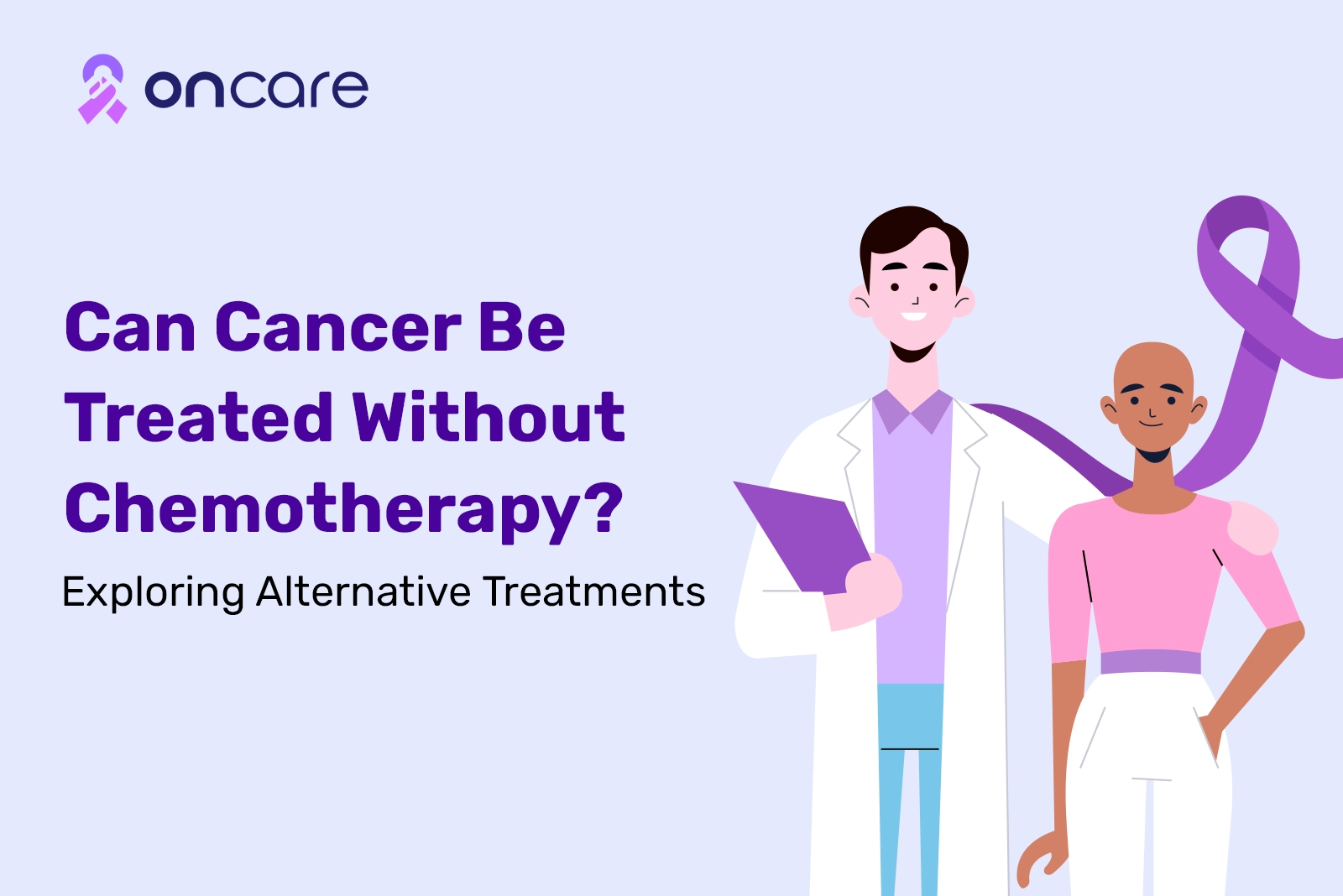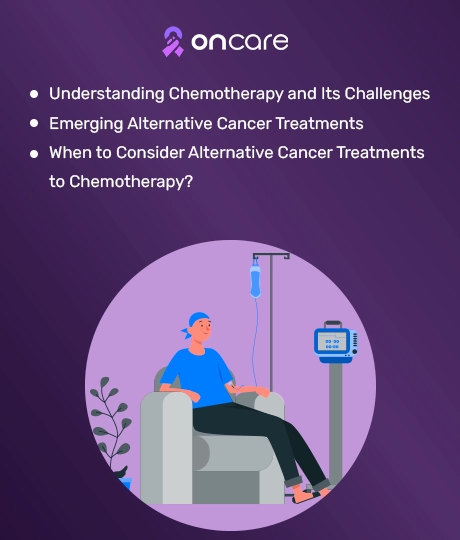Can Cancer Be Treated Without Chemotherapy? Exploring Alternative Treatments

Chemotherapy has long been recognized as the most common treatment for cancer, but it is not the only one. Thanks to advancements in medical science, people are now taking an interest in alternative cancer treatments that could be just as effective with fewer side effects. These range from immunotherapy to stem cell therapy; each offering different ways to fight cancer without presenting the harsh effects of chemotherapy. Thus, treating cancer without chemotherapy is potentially possible. However, it might depend on the type of cancer, the stage, and other circumstances. At Oncare, we believe there is no single solution to cancer treatment. Since chemotherapy is not suitable for every patient, we work along the lines of immunotherapy, targeted therapy, or precision medicine and help patients find the best options that suit their unique needs.
So, if you or a loved one are exploring alternative options, this guide will help you understand the latest cancer treatments beyond chemotherapy.
Understanding Chemotherapy and Its Challenges
Chemotherapy is an effective weapon against cancer, there's no denying it, but it also has its price. And we don't just mean the monetary price. There are brutal side effects such as nausea, hair loss, fatigue, a depressed immune system, and so on and so forth. It does a great job of killing cancerous cells, but it also kills healthy cells in the process, rendering some of the side effects quite harsh.
Because of this, more and more people are looking for alternatives. The good news? Medical advancements have brought us a variety of other treatments that can either replace or work alongside chemotherapy, depending on the diagnosis.

Emerging Alternative Cancer Treatments
Now, let's discuss the game-changers in cancer therapy. These are not simply hypotheses or trial concepts—they're actual, scientifically proven approaches that are saving lives. Here are some of the alternative therapies we offer at Oncare:
Immunotherapy
Consider immunotherapy to be a battery for your immune system. Instead of directly affecting the cancer cells in a way similar to chemotherapy, this therapy works to augment your body's ability to spot and naturally kill them. Precision-tuned and intelligent treatment, it has a lesser chance of having nasty side effects compared to old-time therapies. Immunotherapy has become a revolution in therapy for melanoma and lung cancer.
When given the right kind of approach, the body's own defense system could become the strongest ally for the patient to fight the disease. Oncare offers modern immunotherapy treatments customized for every patient depending on the type of cancer they have. Our goal is to provide solutions that are both effective and easier on the body.
Targeted Therapy
Targeted therapy is meant to attack specific faulty molecules involved in the multiplication and spread of cancer cells, blocking their function. In contrast to chemotherapy, which affects both tumor cells and healthy cells, such therapy is aimed only at active killers.
This approach works best for breast, lung, and colorectal cancers that already have genetic mutations known. The best part? It tends to have milder side effects than chemotherapy, simply because it's more targeted.
Hormone Therapy
Hormone-sensitive cancers, such as breast and prostate, multiply and thrive on hormones. This method of treatment works to bring down hormone levels within the body or to simply block their effects; in effect, this approach is starving the cancer cells of what they need to grow.
Hormone therapy is for hormone-sensitive cancers and is an excellent alternative to chemotherapy for patients who wish not to undergo chemotherapy.
Precision Medicine
This is where it gets really interesting: precision medicine goes really in-depth into your genetics to determine what kind of treatment will work best for you personally. It is highly customized, ensuring that you're not getting just one form of treatment for everybody. Oncologists look at your DNA to figure out what specific treatment works best with the type of cancer that you have. In a nutshell, precision medicine makes sure that you get the precise treatment at the right time, thereby limiting needless side effects while maximizing effectiveness.
At Oncare, our oncologists strive to deliver the ideal treatments according to a patient's individual genetic constitution through precision medicine. This not only assures more efficiency but also reduces unnecessary side effects.
Stem Cell Therapy
Stem cell therapy will be yet another ground-breaking advance for cancer, wherein damaged cells are replaced by healthy, undamaged cells, helping the body to recover quickly from both cancer & the effects of its treatment. It has great potential for blood cancers such as leukemia and lymphoma, as it can undo the damage chemotherapy does to the bone marrow. This allows the patient to recover the immune system after treatment. In some rare cases, it can be used as a primary treatment itself. While often used alongside chemotherapy, in some cases, stem cell therapy can serve as a primary treatment option, offering patients an alternative to harsher methods.
Bone Marrow Transplant
Bone marrow transplant is one of the advanced treatments whereby unhealthy blood-forming cells are replaced with healthy ones. Generally, this type of transplant is used for patients with leukemia, lymphoma, and multiple myeloma. There are two types of bone marrow transplants:
- Autologous transplant – Using the patient’s own stem cells
- Allogeneic transplant – Using stem cells from a donor
Despite sounding similar to stem cell therapy, the difference is this: in a bone marrow transplant, healthy bone marrow is harvested, either from the patient or a donor, and then implanted back in order to help the body produce new healthy blood cells.
When to Consider Alternative Cancer Treatments to Chemotherapy?
Chemotherapy might not suit some cancer types, while some alternatives and combinations may work better; when exploring options that don't involve chemotherapy, the following suggestions might help.
- Type of Cancer – Certain cancers, among them types of leukemia, react positively to treatments involving bone marrow transplant, while other types, such as melanoma, are likely to benefit from immunotherapy instead.
- Stage of Cancer – Early-stage cancer may have treatment options other than chemotherapy, whereas advanced-stage cancer might require combined therapies.
- Personal Health & Preferences – Some cannot even tolerate chemotherapy on account of other health ailments, while some simply wish to forego the severe adverse effects that come with it.
- Genetic Factors – Precision medicine has made it possible to find out if the genes causing your cancer are responsive to specific targeted therapies.
At Oncare, we are here to help and support patients with the right decisions to ensure they receive the most effective cancer treatment plan to fight out their condition while looking at their preferences. Our goal is to ensure that every patient receives a customized approach that gives them the best shot at recovery.
Conclusion
In this regard, to many patients, the possibility is a definite yes - cancer can be treated without chemotherapy. The dynamics of oncology are in constant change. Precision medicine, immunotherapy & targeted treatments are rising, slowly overtaking traditional chemotherapy. In fact, these alternative therapies, including hormone therapy, stem cell therapy, or even bone marrow transplants, are offering renewed hope to many patients seeking less invasive options.
Oncare is devoted to giving cancer patients the most up-to-date, effective care possible. With the help of our oncologists’ expertise and their personalized approach, you can decide on a treatment option that will work with your body and lifestyle while fighting against cancer effectively. Visit Oncare today and take the first step towards a better cancer treatment journey!